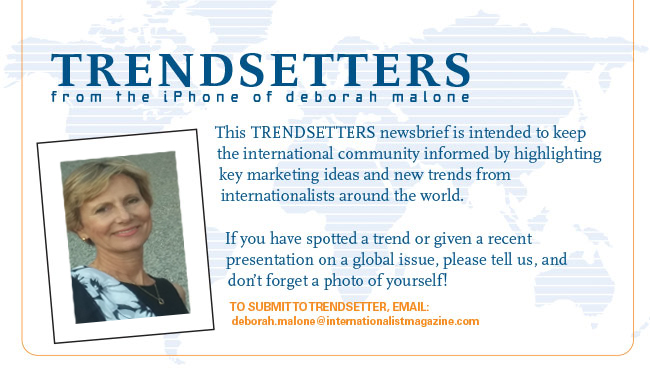

Steve Rubel
See the current issue
of The Internationalist magazine
Find out how to sponsor an issue of Trendsetters
Trendsetters: Edelman's Steve Rubel Offers Critical Advice on Content Creation and Distribution for a Changing Media Ecosystem
Steve Rubel, Chief Content Strategist at Edelman, has earned a well-deserved reputation for being a pioneering thinker on content strategy, the future of media, and how the two are impacting marketers and their brands.
He has evolved Edelman's perspective on how content is produced, distributed, consumed and monetized, while working with teams across their network to help clients better understand changing media consumption habits, as well as the nuances of sponsored content and native advertising. Plus, his weekly CBS Radio podcast, Content Convergence, features conversations with master storytellers from the worlds of marketing, media, technology and entertainment as they explain their strategies for break-through messaging in an era of limited time and attention.
While there's little question that we're living in a media and marketing world where the phrase "content is king" continues to take on new emphasis, Steve Rubel stresses that the distribution of content is now critical. Not only does content distribution have direct implications for brand storytelling, but it underscores how the entire media ecosystem is shifting and why marketers should rethink their approach to content creation. Or as he says succinctly, "Think distribution as you make content as there are direct storytelling implications."
In fact, he believes that one of the greatest challenges marketing and communications professionals will face in the foreseeable future is what he calls "extending the lifecycle of a narrative."
Steve emphasizes three significant factors—1.) mobile personalization, 2.) media fragmentation and 3.) advertiser frustration—that are affecting how content is discovered, consumed and monetized. Each plays a significant role in determining which stories will reach their intended audience.
The growth of mobile has caused a significant shift in how content is discovered. Most mobile user time is spent with five top apps, including Google and Facebook. As a result, news has become highly filtered through the lens of "friends." In a fragmented media world, information is consumed in sound bites at a time when attention is finite, while content feels infinite. As Ad Blocking becomes increasingly mainstream, there continues to be questions about ad measurement and the effectiveness of the ad supply chain—all adding to marketer frustration and distrust.
These "ecosystem disruptors" impact publishers, as well as any content creator that hopes to deliver a narrative.
Steve Rubel recommends five strategies marketers should embrace to ensure their communications marketing narratives are discoverable within today's ecosystem:
- Develop social storylines. Social media has become the primary means of "content discovery." As a result, the news you read is often different than news you say you read. Rubel's advice is to adopt a social-by-design approach to storytelling from the outset of any communications program.
- Embrace distribution-centric thinking.This means that brands will need to partner with publishers, influencers and others to build scale in today's digital ecosystem.
- Drive to earned media. He recommends developing initiatives that create owned media to drive earned media. Steve Rubel describes original content as the ‘lead domino' that starts a chain reaction of conversations.
- Create a single narrative. A singular narrative that is hand-crafted to the many elements of today's ecosystem will ultimately be discovered, shared and consumed.
- Focus on creating high-interest, high-quality content. Stories that are unique and not available elsewhere will find an audience simply because they are rare.
MORE
Edelman has created a holistic framework for the digital information ecosystem to demonstrate how to extend the lifecycle of a narrative. Called the Edelman Cloverleaf™, it shows how platforms in social and search, plus curators—like Flipboard and Pandora, interact with publishers who may be influencers, media or brands.
Edelman is the world’s largest communications marketing firm, with 72 offices and more than 5,500 employees worldwide, as well as affiliates in more than 30 cities.
